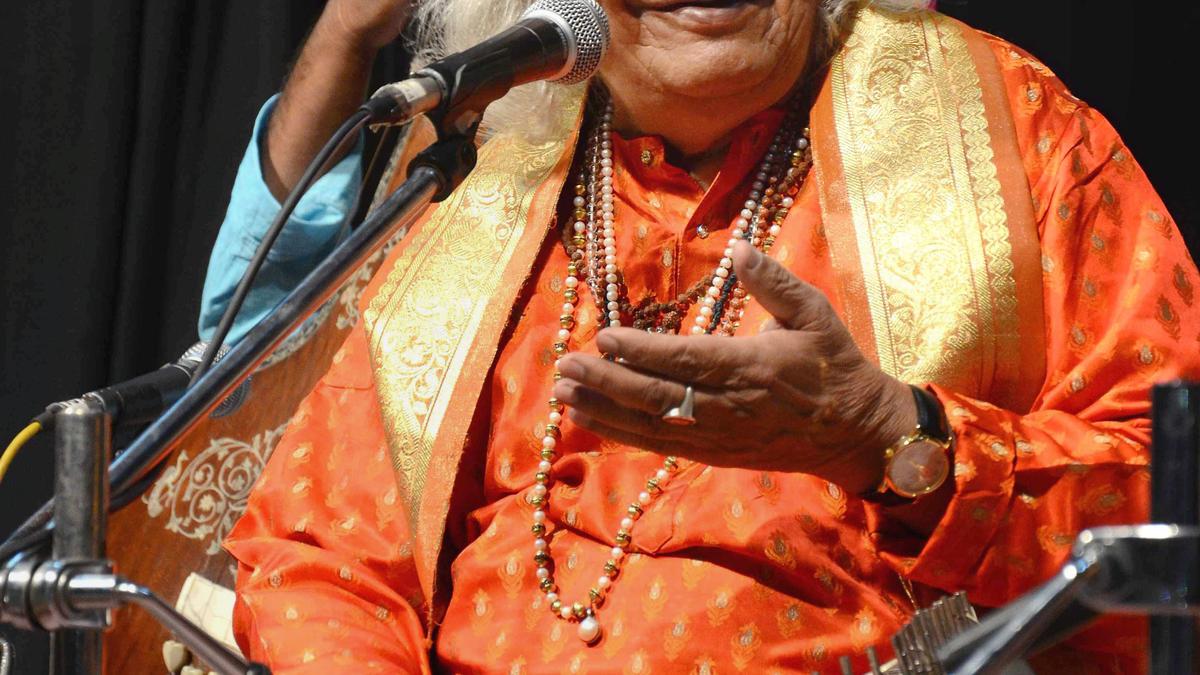Pt. Chhannulal Mishra during a concert in Bhopal, Madhya Pradesh
| Photo Credit: PTI
It was perhaps fitting that Pt. Chhannulal Mishra breathed his last on Dussehra — his most enduring legacy are his recordings dedicated to Lord Ram. Whether it was the four-volume rendition of the Sundarkand, the evocative Ram Vivaha, or his popularity as a kathaakar. His album Ram Raga has him singing only the words ‘Raja Ram’ for more than one hour in a deeply moving tribute to devotion. Pt. Chhannulal was a rare artiste whose music transcended the boundaries of classical raga.
Born on August 3, 1936, in the musically rich village of Hariharpur in Azamgarh — often described as a place inhabited only by musicians — Chhannulal trained as a vocalist at an early age. His marriage to Manorama, daughter of the Benaras gharana tabla maestro Pt. Anokhelal Mishra, cemented his position in the vibrant classical music world of Benaras. He also trained under Kirana gharana vocalist Ustad Abdul Ghani Khan — a lesser-known performer but an erudite master. Ustad Mashkur Ali Khan, one of the most knowledgeable musicians of the Kirana gharana, recalls hearing that Pt. Chhannulal Mishra also received guidance from Ustad Ghani Khan’s son, Ahmed. This cross-gharana training contributed to the depth that marked his music.
Pt. Chhannulal was profoundly influenced musicologist and scholar Thakur Jaideva Singh, who had made Benaras his home. It was perhaps this influence that deepened his understanding of the intrinsic link between music and devotion. For Pt. Chhannulal, bhakti was not merely a theme; it was the very essence of his music.
Recognition from the wider world came late to him, despite his poularity in Benaras and musical knowledge. He remained a dedicated teacher throughout his life; once, when I asked him about a singer’s claim of discipleship, Panditji laughed good-naturedly and said, “If her career can flourish by calling herself my sishya, why should I deny it?” He even taught Pt. Veerbhadra Mishra, the saintly ‘mahant’ of the Sankat Mochan Temple in Benaras.
His iconic recordings with the Devi Foundation brought him to a wider stage in the early 2000s, when he was already over 60. The first album, Anjali (2001), was a resounding success — released in Mumbai by Amitabh Bachchan and in Delhi by former Chief Minister Sheila Dikshit. Soon after, he became a fixture at virtually every major music festival in the country. Yet he remained equally committed to singing at intimate baithaks. He even lent his voice to a few films. Jai Sinha of Devi Foundation, however, laments that his demanding schedule left no time to complete the Foundation’s planned recording of the entire Ramcharitmanas. “It is a huge loss,” Sinha said, “as no one was better equipped to sing it.”
Pt. Chhannulal affability on stage, his instinctive connect with audiences, and his humour made him much-lover performer. He engaged with all types of listeners — connoisseurs as well as the uninitiated — with equal ease and warmth. He had a distinctive gravelly voice, honed to a molten mellowness with decades of riyaaz. He drew audiences wherever he sang — almost always with his son, Ram Kumar Mishra on the tabla.
His popularity as a bhajan singer often overshadowed his strong classical training. Apart from his bhajans, recorded by Devi Foundation, Pt. Channulal was also a distinguished thumri singer. He was adept in both the Banaras and Gaya styles. His vast repertoire included rare Horis — some dedicated even to Shiva, such as ‘Khelen masaane mein Holi, Digambar’ (lets play Holi in the cremation ground) He also sang a wide range of folk songs and did not have the usual disdain that classical musicians have for non-classical forms. For him, music was always a medium of communication, and no genre was ever inadequate for that purpose.
Accolades came to him slowly, but they did come. First, the Uttar Pradesh Sangeet Natak Akademi recognition in 2000, when he was 64. A decade later, in 2010, he received both the Sangeet Natak Akademi award and the Padma Bhushan. These were followed by the Akademi Fellowship in 2019 and, a year later, the Padma Vibhushan in 2020. With his passing, Indian classical music has lost an irreplaceable voice — a simple and an ever-smiling artiste.
Published – October 03, 2025 04:27 pm IST

